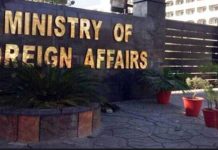DNA
ISLAMABAD, OCT 16: The house unanimously supported the demand to raise the minimum age of marriage of girls to 18 years of age throughout Pakistan. Sindh is the only province in Pakistan where the minimum age of marriage for girls is 18 years.
PODA organized a 3-day 16th Annual RURAL Women Leadership Conference in Islamabad which will culminate tomorrow (Tuesday, 17th October) on award ceremony to honor the rural women leaders who have been excelled in their regions while promoting human rights. PODA has started organizing the conference since 2008. It is one of the biggest platforms in the country through which specifically rural women representing all regions of the country voice their concerns on issues which affect them most. This year the theme of the conference i.e. “Stop Child Marriages for Sustainable Development, Climate and Democracy” was set with the input of the women leaders who are the primary custodians of the platform of the rural women conference. This year, PODA brought representatives from over 150 districts of the country, including ICT, Islamabad and regions of AJK and Gilgit-Baltistan. Rural women in hundreds were present during the 2nd day of the conference to call upon the policymakers, legislatures and all segments of the society to work for the protection of the rights of a girl-child who is not able to voice for her own rights, who wants to play, wants to live a healthy life, wants to get education and lead a dignified life as a full-fledged citizen of the country and who wants to exercise all the entitlements written in the Constitution of Pakistan.
“We are working specifically in 41 districts of Punjab, involving and engaging all concerned including communities and government officials to work together to increase the minimum age of marriage of girls to 18 years through a legal amendment. However, it is high time to introduce same age defining who is child in all laws to have a unanimity not discrepancies at national level,” said Sameena Nazir, PODA Executive Director.
“The enforcement mechanisms of child marriage prevention are weak and insufficient and the role of the police needs clarity and direction legally and institutionally. Political parties need to commit to increase the minimum age of marriage to 18 years. Rural women will present on the ground situation about child marriages and share what are the key obstacles for prevention of child marriages and what strategic action is needed to protect the human rights of girls under age 18,” another speaker added.
Fauzia Yazdani, Policy Advisor and Journalist moderated the session. The speaker of this session included, Sumera Shaheen, Director Thal Development Organization, Bhakkar, Amina Mulazim, Vice President Chaman Welfare Society, Chiniot, Kausar Shaheen, President of Lady Health Workers’ Union, Lodhran and Dr. Anoosh Masood, Senior Superintendent of Police, Lahore.
Surriya Asghar, former Member National Assembly and Riffat Inam Butt, Secretary, Law and Justice Commission Pakistan spoke on the occasion.
Ayesha Raza Farooq, Chairperson National Commission on Child Rights said____.
HE Mr. Per Albert Ilsaas, Ambassador of Norway in Pakistan said, “protecting and promoting women’s rights has high priority in Norwegian foreign and development policy, Child early and forced marriage is form of gender-based violence and a human rights’ violation that deprives those involved of choice and autonomy over their lives and their own bodies”.
Pakistan is 5th most populous country in the world with 230 million people and 6th highest country with alarming number of girls married before the age of 18 in the world including girls with disabilities and from minority religious communities.
Through the session on “Asserting Rural Women’s Leadership for Food, Nutrition, Population and Climate Change Adaptation Decision-Making” the rural women explored ways to provide nutritional food awareness messages to rural women to improve knowledge about food diversity and the importance of understanding different and new ways of getting nutrition for women.
Dr. Shabina Raza, Country Director, Nutritional International said, “malnourished mothers more likely to give-birth-weight infants, who are at higher risk of malnutrition and related health issues. Young mothers usually lack the knowledge or support needed to practice optimal breastfeeding and complementary feeding which are essential for infant nutrition potentially resulting in undernourished infants and children.”
“Keeping in view that climate change has impacted women’s food and livelihoods options negatively yet women are not included in the knowledge sharing and decision making processes about climate change adaptation mitigation processes, we believe to bring women upfront to tackle the adverse effects of climate change on their lives to find their own solutions here through the platform of the conference,” said Dr. Fozia Kanwal, agronomist.
Bushra Tabassum, Muzafarabad, Azad Jammu & Kashmir, Pushpa Kumari, Vice President of Sindh Climate Action Network (SCAN), Dheli Bai, President of Women Self Help Group Sindh, Shirin Akhter, Ghanche, Gilgit-Baltistan, Dr. Shahid Fazal, Technical Advisor for Maternal Nutrition Campaign, Nutrition International, Mr. Marco Mmarchetti, Representative, Olive Culture Pakistan, Dr. Shabina Riaz, Country Director Nutrition International (NI) and Rina Saeed, Chairperson Islamabad Wildlife Management Board, Islamabad. A larger number of rural women gave deep insight on the issues related to the nutritious food. They were of the view that young mother who lack nutritious food are unable to feed their infants and help lead their families for a dignified life.

















